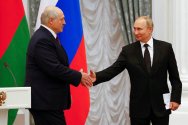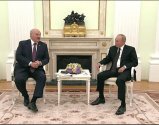The remarks come after Putin said that Moscow’s relations with Beijing are now at an “unprecedented” level
By Layla Guest
In the face of strained relations between East and West, Russia is depending on China more than ever to help establish an equal playing field between global powers, one of Moscow’s most senior envoys has revealed.
Speaking as part of an interview with RIA Novosti on Friday, Russia’s deputy permanent representative to the UN, Dmitry Polyansky, set out his view on his country’s growing standoff with the US and some of its allies in Europe.
“Our Western partners can no longer ignore our concerns, if, of course, they are really interested in peace and stability in the world as a whole and, in particular, in Europe,” he argued.
According to Polyansky, Russia is “counting on China's support, since it is our closest neighbor and our strategic partner.” He went on, adding that Beijing and Moscow enjoy an "all-weather" relationship, which allows the two to have dialogue “on the most complex international issues, as well as other matters, and find common ground.”
“As the outcome of the talks between the presidents of Russia and China on the sidelines of the opening ceremony of the Winter Olympics in Beijing highlights, our Chinese partners fully understand and share our concerns and support our position on European security issues,” the envoy noted.
His remarks come after Russian President Vladimir Putin and his Chinese counterpart Xi Jinping issued a joint call for NATO to renounce any plans of enlargement and abandon its ‘Cold War’ mentality following a meeting between the two leaders.
“The parties oppose the further expansion of NATO and call for the North Atlantic Alliance to refrain from ideological approaches from the time of the Cold War,” the statement published by the Kremlin reads. It also urged the bloc “to respect sovereignty, security, the interests of other countries, and the diversity of their civilizational and cultural-historical ways; and to deal with the peaceful development of other governments objectively and fairly.”
Tensions have flared in recent weeks, with a number of Western leaders warning that Russia could soon order an invasion of Ukraine. Moscow has repeatedly insisted that it has no aggressive intentions, and has sought to obtain security guarantees that would limit the US-led military bloc from widening.
Kremlin aide Yuri Ushakov said that Xi fully backs Russia’s pursuit of assurances from NATO following discussions between the two heads of state in December, a particularly notable revelation as Beijing has previously looked to distance itself from Moscow’s issues with other European nations.
“Since the chairman [Xi] specifically stated that he supports Russia’s demands for guarantees, he is naturally well aware of and understands the main issue: the concerns Russia has on its western borders,” Putin’s foreign policy adviser said, adding that the two sides would keep in contact on this matter.
Moscow and Beijing have stressed the importance of their relationship in a number of areas, including trade, energy, economics, and defense, in the face of Western pressure in recent months. Despite signs of growing cooperation between Russia and China, several analysts have hinted that the partnership is less developed in comparison to other blocs, such as NATO.


